David Cranmer's Blog, page 85
October 5, 2013
Garnett Elliott's Bookshelf
I was putting some paperbacks from storage on their new bookshelf 'home' when it occurred to me that some people might wonder why I've arranged them in the way that I have. Then I thought, "Wonder how other writers' bookshelves look as they organize their most prized worldly possessions." A couple of days later, I was corresponding with Garnett Elliott and asked him if he didn't mind sharing. Ask and ye shall receive:
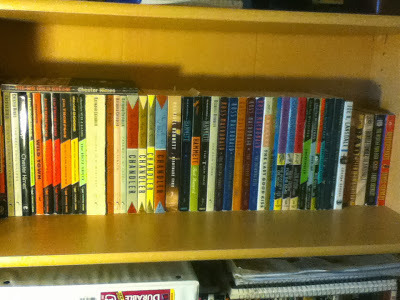
Here's the "prized books" section of my bookcase, with all the hardboiled authors who have had the most influence of my writing. Though it's hard to see, from left to right is: Himes, Higgins ('The Friends of Eddie Coyle,' natch), Thompson, Goodis, Williams (Charles Williams--'The Hot Spot'), Chandler, Hammett, MacDonald (I've got McDonald, too, but on another shelf), Crumley, Willeford, Cain, Peter Rabe, and of course, Mojo Storyteller, Joe R. Lansdale.

Published on October 05, 2013 16:04
October 4, 2013
Dundee On Hell Up
I saw this Amazon review from Wayne D. Dundee for HELL UP IN HOUSTON, the second in BEAT to a PULP’s Jack Laramie series, and I had to share. I’ve been a fan of Mr. Dundee for a long time and can still remember, sitting at my laptop (and being floored) in 2010, that he had contributed his well-renowned detective Joe Hannibal for the BEAT to a PULP webzine. Since, Joe has returned several times and Mr. Dundee has written three superior Cash Laramie novels—latest out next week. I’m very grateful for his continuing support and even more grateful to call a man I admire, friend.
Hell Up In Houston is a Hell of a Good Read by Wayne D. Dundee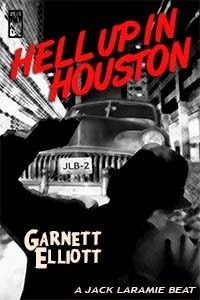 This second title in the Jack Laramie series is another intriguing entry that slams the roaming PI up against some mighty hard edges and spins him around in a number of deft plot twists. The pace never lets up and, even though you know Jack is going to get his bearings and do some hard pushing back before it's all over, you're driven to keep reading in order to find out how and also learn the answers he needs before he can settle all scores.
This second title in the Jack Laramie series is another intriguing entry that slams the roaming PI up against some mighty hard edges and spins him around in a number of deft plot twists. The pace never lets up and, even though you know Jack is going to get his bearings and do some hard pushing back before it's all over, you're driven to keep reading in order to find out how and also learn the answers he needs before he can settle all scores.
Spawned by David Cranmer's popular Cash Laramie westerns, Jack is the grandson of ol' Cash who --- in place of his grandfather's U.S. Marshal star --- has taken up the plastic badge of a PI during the early post-WWII years. Unbound by a standard office in a particular city, however, Jack roams West Texas and surrounding areas hunting up cases where he finds them. He covers the miles in a hard-driven old DeSoto, pulling a horse trailer that serves as a mobile office and, as needed, his living quarters. This concept gives the overall series a nice distinction right from the get-go.
In this tale, returning to Houston is just about the last thing Jack wants to do. The last place he wants to be. But misfortune, in the form of a blown radiator on his DeSoto, plants him there ... and, by the time he's ready to leave, he has even more reasons for never wanting to go back
Recommended.
Hell Up In Houston is a Hell of a Good Read by Wayne D. Dundee
 This second title in the Jack Laramie series is another intriguing entry that slams the roaming PI up against some mighty hard edges and spins him around in a number of deft plot twists. The pace never lets up and, even though you know Jack is going to get his bearings and do some hard pushing back before it's all over, you're driven to keep reading in order to find out how and also learn the answers he needs before he can settle all scores.
This second title in the Jack Laramie series is another intriguing entry that slams the roaming PI up against some mighty hard edges and spins him around in a number of deft plot twists. The pace never lets up and, even though you know Jack is going to get his bearings and do some hard pushing back before it's all over, you're driven to keep reading in order to find out how and also learn the answers he needs before he can settle all scores.Spawned by David Cranmer's popular Cash Laramie westerns, Jack is the grandson of ol' Cash who --- in place of his grandfather's U.S. Marshal star --- has taken up the plastic badge of a PI during the early post-WWII years. Unbound by a standard office in a particular city, however, Jack roams West Texas and surrounding areas hunting up cases where he finds them. He covers the miles in a hard-driven old DeSoto, pulling a horse trailer that serves as a mobile office and, as needed, his living quarters. This concept gives the overall series a nice distinction right from the get-go.
In this tale, returning to Houston is just about the last thing Jack wants to do. The last place he wants to be. But misfortune, in the form of a blown radiator on his DeSoto, plants him there ... and, by the time he's ready to leave, he has even more reasons for never wanting to go back
Recommended.
Published on October 04, 2013 14:42
September 29, 2013
Zenda!
Most of mom’s books were destroyed in the fire that claimed my nephew’s life. The material possessions are quite secondary to our greatest loss. And I hadn’t really thought much about mom’s eclectic collection of biblical, political, literary, poetry and pulp novels. (Yes, now you know where some of the inspiration came from for both me and Kyle.)
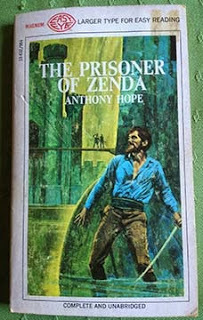 Cover illustration by Fred Pfeiffer.My charmers and I have been settling into a new home, and, over this weekend, we went to the storage unit for a few items when I began rummaging through some boxes. In them, I found a few of my mom’s books. I lit up. There was THE PRISONER OF ZENDA by Anthony Hope. That 1968 paperback, probably bought off a spinner rack, had a cover that simply mesmerized me as a kid before I was even old enough to read. Who was the guy trying to escape from? Would he get past the sentries on the bridge? Zenda!The very name sounded like excitement.
Cover illustration by Fred Pfeiffer.My charmers and I have been settling into a new home, and, over this weekend, we went to the storage unit for a few items when I began rummaging through some boxes. In them, I found a few of my mom’s books. I lit up. There was THE PRISONER OF ZENDA by Anthony Hope. That 1968 paperback, probably bought off a spinner rack, had a cover that simply mesmerized me as a kid before I was even old enough to read. Who was the guy trying to escape from? Would he get past the sentries on the bridge? Zenda!The very name sounded like excitement.
Ronald Coleman—one of mom’s favorite actors—starred in the 1937 film adaptation, and I still remember how her eyes would grow wide when she said his name. “What a magnificent actor!” she’d rave, then she’d add very dramatically, “I always loved movies of Kings and Queens!” She must have told me that a thousand times as I was growing up. I smile now when I imagine my mom as an eleven-year-old girl thrilled about going to see her favorite actors fight it out on the silver screen.
I think I will hermetically seal this paperback. Yep. Going to save it for another generation ... “Ava, let me tell you about THE PRISONER OF ZENDA. Here’s your grandmother’s copy ...”
 Cover illustration by Fred Pfeiffer.My charmers and I have been settling into a new home, and, over this weekend, we went to the storage unit for a few items when I began rummaging through some boxes. In them, I found a few of my mom’s books. I lit up. There was THE PRISONER OF ZENDA by Anthony Hope. That 1968 paperback, probably bought off a spinner rack, had a cover that simply mesmerized me as a kid before I was even old enough to read. Who was the guy trying to escape from? Would he get past the sentries on the bridge? Zenda!The very name sounded like excitement.
Cover illustration by Fred Pfeiffer.My charmers and I have been settling into a new home, and, over this weekend, we went to the storage unit for a few items when I began rummaging through some boxes. In them, I found a few of my mom’s books. I lit up. There was THE PRISONER OF ZENDA by Anthony Hope. That 1968 paperback, probably bought off a spinner rack, had a cover that simply mesmerized me as a kid before I was even old enough to read. Who was the guy trying to escape from? Would he get past the sentries on the bridge? Zenda!The very name sounded like excitement. Ronald Coleman—one of mom’s favorite actors—starred in the 1937 film adaptation, and I still remember how her eyes would grow wide when she said his name. “What a magnificent actor!” she’d rave, then she’d add very dramatically, “I always loved movies of Kings and Queens!” She must have told me that a thousand times as I was growing up. I smile now when I imagine my mom as an eleven-year-old girl thrilled about going to see her favorite actors fight it out on the silver screen.
I think I will hermetically seal this paperback. Yep. Going to save it for another generation ... “Ava, let me tell you about THE PRISONER OF ZENDA. Here’s your grandmother’s copy ...”
Published on September 29, 2013 16:25
September 26, 2013
Sherlock
 I’m late to the game here—no surprise—finally watching Benedict Cumberbatch’s Sherlock Holmes set in present day England. Didn’t think they could pull it off, but the way they’ve combined modern tech with Sherlock’s computing brain is riveting. Martin Freeman as Doctor John Watson, who’s returned from grueling tour of duty in Afghanistan, is a perfect match as a man of action. The whole cast and presentation is above the average, and it got me thinking of my list of top SH portrayals. Starting with:
I’m late to the game here—no surprise—finally watching Benedict Cumberbatch’s Sherlock Holmes set in present day England. Didn’t think they could pull it off, but the way they’ve combined modern tech with Sherlock’s computing brain is riveting. Martin Freeman as Doctor John Watson, who’s returned from grueling tour of duty in Afghanistan, is a perfect match as a man of action. The whole cast and presentation is above the average, and it got me thinking of my list of top SH portrayals. Starting with: Jeremy Brett -- The definitive Sherlock Holmes. An actor who melded with the role. Brett appeared in 41 episodes of the Granada series (1984-1994) and became the new standard.
Benedict Cumberbatch -- This updated SH makes me forget that Holmes was originally a 19th century detective. So far I’ve watched only the first two episodes, “A Study in Pink” and “The Blind Banker,” and if the rest of the series holds form, I’m sold on Cumberbatch.
Basil Rathbone played the part from 1939-1946 -- The first Sherlock Holmes I ever watched. When the SH name is brought up, I immediately think of him in my mind’s eyes. I still enjoy watching Rathbone’s The Hound of the Baskervilles film, though I didn’t care for his Holmes update to the WWII war effort.
Peter Cushing (1968) -- The production doesn’t quite live up to others in standards, but Cushing delivers an equally tremendous performance. I recently watched his SH portrayal on a new DVD release, and plan to watch them again soon.
Also in my top ten would be Arthur Wontner, Michael Caine, and Christopher Lee. Since some 75 actors have played Sherlock Holmes in 200 plus films, maybe my partial list is quite different from yours. Set me straight, my Sherlockians!
Published on September 26, 2013 06:55
September 24, 2013
Heath
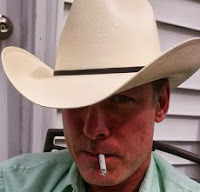 Heath Lowrance just got out of the hospital and has written a very touching post. Stop over when you get a chance.
Heath Lowrance just got out of the hospital and has written a very touching post. Stop over when you get a chance.
Published on September 24, 2013 14:32
September 22, 2013
Frequencies Open, Captain Cranmer
I’m on the USS Enterprise, my first day on the job, walking around in jeans and a plain old T-shirt. I’m led into a room that’s to the right of the elevator in the original series. I know that’s not spatially correct, but I have bigger concerns ... I’m worried about what color shirt I’ll be wearing. Please don’t be red! I tell myself. In the room, I’m handed a ‘Spock’ blue shirt, and I sigh a relief.
I’m left alone to put it on. It feels comfortable (though I remember William Shatner said in an interview that they were not), but it’s too long, stretching almost to my knees. I don’t have time to think about it as someone comes in and whisks me away, out of the starship.
The Enterprise is docked on Earth, and it’s a beautiful sunny day. Apparently, back on board, the crew members on the bridge are preparing for an emergency drill training session that I will be leading. Sensing my unease, Kirk slaps me on the back and says, “You’ll do fine.” Then he escorts me back to the bridge. The training begins with a scenario of another ship’s crew in danger on a foreign planet.
“Open all frequencies,” I tell Uhura.
“Frequencies open, Captain,” she replies.
I speak loudly into the air, asking, “How many casualties?”
“Seventy-nine,” a male voice crackles back from the imagined faraway outpost. Anguished screams and explosions sound in the background. They are under attack from a formidable opponent. Probably Klingon.
I tell him what to do to save his crew and repair the situation. “Keep me posted,” I command with authority. I click off the intercom, and then as an afterthought, I click back on, adding, “But don’t call us, we’ll call you!”
My lame joke is well received with everyone on the Enterprise Bridge as they double over with laughter.
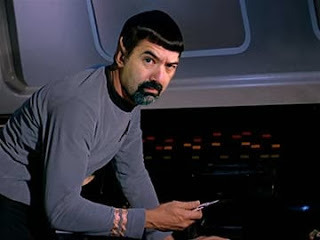
I’m left alone to put it on. It feels comfortable (though I remember William Shatner said in an interview that they were not), but it’s too long, stretching almost to my knees. I don’t have time to think about it as someone comes in and whisks me away, out of the starship.
The Enterprise is docked on Earth, and it’s a beautiful sunny day. Apparently, back on board, the crew members on the bridge are preparing for an emergency drill training session that I will be leading. Sensing my unease, Kirk slaps me on the back and says, “You’ll do fine.” Then he escorts me back to the bridge. The training begins with a scenario of another ship’s crew in danger on a foreign planet.
“Open all frequencies,” I tell Uhura.
“Frequencies open, Captain,” she replies.
I speak loudly into the air, asking, “How many casualties?”
“Seventy-nine,” a male voice crackles back from the imagined faraway outpost. Anguished screams and explosions sound in the background. They are under attack from a formidable opponent. Probably Klingon.
I tell him what to do to save his crew and repair the situation. “Keep me posted,” I command with authority. I click off the intercom, and then as an afterthought, I click back on, adding, “But don’t call us, we’ll call you!”
My lame joke is well received with everyone on the Enterprise Bridge as they double over with laughter.

Published on September 22, 2013 07:17
September 21, 2013
The Girl They Loved To Kill
The tragic life and career of Peggie Castle, a woman who made a brief living out of dying in film noir. -- Jake Hinkson
Published on September 21, 2013 03:42
September 19, 2013
James Reasoner’s Death and the Dancing Shadows
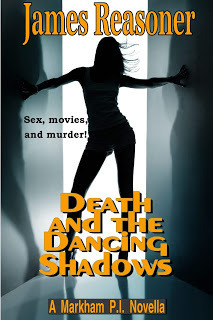 James Reasoner’s “Death and the Dancing Shadows” features his Markham PI who is called to the home of retired movie star Eliot “Lucky” Tremaine. Turns out Tremaine is being blackmailed by video of his missing granddaughter, Stacy, in a porn film. The girl’s trail leads to murder and thugs who rough up the P.I. I spotted the twist at the end but was rewarded with Mr. Reasoner’s very sobering last paragraph where Markham does the right thing.
James Reasoner’s “Death and the Dancing Shadows” features his Markham PI who is called to the home of retired movie star Eliot “Lucky” Tremaine. Turns out Tremaine is being blackmailed by video of his missing granddaughter, Stacy, in a porn film. The girl’s trail leads to murder and thugs who rough up the P.I. I spotted the twist at the end but was rewarded with Mr. Reasoner’s very sobering last paragraph where Markham does the right thing.“Dancing Shadows” is a 9,000 word novella originally published in the March 1980 issue of MIKE SHAYNE MYSTERY MAGAZINE. I hope Mr. Reasoner releases more of these old gems.
Grab a copy of this book at $0.99 and schedule yourself a half hour. You’ll be thoroughly entertained.
Published on September 19, 2013 13:24
September 17, 2013
On the Death of a Friend
I interviewed one of Kyle Knapp's very good friends, Amanda Shaw, and asked her for a little insight into her time with Kyle, of the work they did together, and how Kyle's death has impacted her.
How long had you known Kyle?
 Amanda ShawI've known Kyle since I was fourteen, so 8 almost 9 years. I was sitting outside during lunch hour at school. He liked my moccasins and Green Day T-shirt so he sat beside me and just started talking to me; he tried to teach me to play hacky sack, but that didn't work, so for 8 years we just kept talking.
Amanda ShawI've known Kyle since I was fourteen, so 8 almost 9 years. I was sitting outside during lunch hour at school. He liked my moccasins and Green Day T-shirt so he sat beside me and just started talking to me; he tried to teach me to play hacky sack, but that didn't work, so for 8 years we just kept talking.
Were you aware that he kept scores of notebooks in which to compose his poetry and other writings?
He didn't tell me about his writings until a couple years into our friendship, but I think the moment I became a part of them is when he told me about them. Last fall, after I returned from Colorado, was my first visit to the Mill Street house and the first time I actually saw the physical volume of his work though he’s always sent me a story here and there to edit; he always seemed to trust my opinion on his writing, but honestly I was usually just proofing his grammar. From early on I realized his works were special and unlike anything I've ever read.
You worked together on a short story inspired by Salinger, right? How’d that come about?
Kyle believed in me as a writer. I am really private about the things I write, mostly because they are the ramblings of the inner workings of my head, but I guess also because I am not confident in what I put on paper. I shared them with Kyle though; he was one of the very few I trust most. So anyway, last semester I was retaking creative writing and of course Kyle had to know about every assignment. I had a simple journal exercise that involved writing out a conversation between me and my favorite character; I shared that journal assignment in class and my professor really enjoyed the way I wrote the conversation with Seymour from “A Perfect Day for Bananafish,” by J.D. Salinger. My professor suggested this be the start of my short story assignment. I immediately called Kyle and told him about how I was going to attempt writing a story within another story. He had never read “Bananafish” so I loaned him the book Nine Stories. I worked on the story by myself and periodically sent Kyle the most recent version of it. He would add little edits here and there, but one evening he said he was bored and edited the entire story into his style of prose. For my final draft I mixed my final draft with Kyle's version. We had so much fun working on the story; we were planning to write a story together using the same basic idea, and plot line from my perspective and his perspective. I am really sad that didn't come to fruition; I think it would have been really great.
How did you find out he had died?
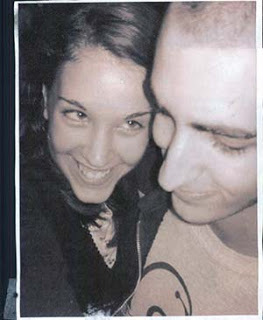 Amanda and Kyle.The two weeks before Kyle died were really rough; I am only mentioning this because it is important to the day I found out he had passed. He had started drinking again, and we were really at odds. He wanted me around to help him, and I couldn't because I wanted him to stop drinking, and I had vowed to him a long time ago that I wouldn't be around him if he was drinking. I would talk to him on the phone and through email all he wanted, but I guess in my way of thinking, hanging out with him and driving him places was enabling him in some sort of way. The day before the fire, a Monday, he called me and begged me to take him for ice cream; he was drunk, so I said no. The fire happened that night, but I didn't find out until that Wednesday. Anyway, on Tuesday I was driving to Rochester for a concert and my boyfriend asked me if I had talked to Kyle that day because Kayla, Kyle’s sister, had posted a Facebook status asking if anyone had heard from him. It hadn't crossed my mind until that moment that Kyle had not called or texted that day, and really for 8 years, a day did not go by that he didn't make contact with me at least once. My heart sank and I said to my boyfriend "What if he is dead?" I called his phone and he didn’t answer; we both decided to ignore the fact that he was missing and enjoy the concert; Kyle would be okay. During the concert, I received text messages from a few high school friends stating "We love you" and "we're here for you," and I just disregarded them not connecting any dots. The next morning Steven, my boyfriend, woke up before me and logged onto Facebook on his phone; he told me to log onto my Facebook and all that I saw were a series of "RIP Kyle." My heart sank, and all I could hear was this weird wurring sound in my ears. I texted Kayla and said something like, "Tell me this isn't real." She didn't respond right away, so I just kept saying this is fake and calling Kyle's phone. Kayla finally texted back with something along the lines "I am so sorry, Amanda. Kyle is gone." I cried the entire rest of that day; Kyle's death is the first death I have ever experienced. Experienced feels like an odd word to use; what I mean is I have never lost a family member except for a grandfather when I was very young, but we were not close. Kyle was my best friend. I am not sure I have ever been closer with another human being. I tried to seek comfort from my grandmother, my mom, my friends, but no one knew what to say and all I could hear was that strange wurring sound in my ears. I wish I had taken him for ice cream.
Amanda and Kyle.The two weeks before Kyle died were really rough; I am only mentioning this because it is important to the day I found out he had passed. He had started drinking again, and we were really at odds. He wanted me around to help him, and I couldn't because I wanted him to stop drinking, and I had vowed to him a long time ago that I wouldn't be around him if he was drinking. I would talk to him on the phone and through email all he wanted, but I guess in my way of thinking, hanging out with him and driving him places was enabling him in some sort of way. The day before the fire, a Monday, he called me and begged me to take him for ice cream; he was drunk, so I said no. The fire happened that night, but I didn't find out until that Wednesday. Anyway, on Tuesday I was driving to Rochester for a concert and my boyfriend asked me if I had talked to Kyle that day because Kayla, Kyle’s sister, had posted a Facebook status asking if anyone had heard from him. It hadn't crossed my mind until that moment that Kyle had not called or texted that day, and really for 8 years, a day did not go by that he didn't make contact with me at least once. My heart sank and I said to my boyfriend "What if he is dead?" I called his phone and he didn’t answer; we both decided to ignore the fact that he was missing and enjoy the concert; Kyle would be okay. During the concert, I received text messages from a few high school friends stating "We love you" and "we're here for you," and I just disregarded them not connecting any dots. The next morning Steven, my boyfriend, woke up before me and logged onto Facebook on his phone; he told me to log onto my Facebook and all that I saw were a series of "RIP Kyle." My heart sank, and all I could hear was this weird wurring sound in my ears. I texted Kayla and said something like, "Tell me this isn't real." She didn't respond right away, so I just kept saying this is fake and calling Kyle's phone. Kayla finally texted back with something along the lines "I am so sorry, Amanda. Kyle is gone." I cried the entire rest of that day; Kyle's death is the first death I have ever experienced. Experienced feels like an odd word to use; what I mean is I have never lost a family member except for a grandfather when I was very young, but we were not close. Kyle was my best friend. I am not sure I have ever been closer with another human being. I tried to seek comfort from my grandmother, my mom, my friends, but no one knew what to say and all I could hear was that strange wurring sound in my ears. I wish I had taken him for ice cream.
Tell me about going to where he died and finding the notebook?
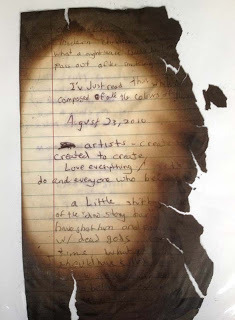 A page from Kyle's notebook.The first few days after Kyle died were the most bizarre days of my life. It felt as if everyone wanted to talk to me. I was bombarded with questions and "I'm sorrys." Many of our mutual friends visited the place where he died--I'd been referring to it as the Mill Street house--and described in horrifying detail how it was just gone. I decided I was not going to go there. The day of his memorial service solidified this decision; I would not visit where he died. I would not see the destruction. It was too hard, I just couldn't. I had been reading every day the last letters he sent me from his time in Florida [in rehab]. I've mentioned them before, but in one of the letters he wrote, "I still want to walk through walls in my dreams, and learn how to find you long after we die." I read and reread this line; I don't know if it was just my deep desire for him to be able to do this or he actually succeeded, but the night after his memorial service, I believe it was a Sunday, I had a dream; Kyle and I were sitting on the back deck of the Mill Street house drinking that organic dark coffee he loved so much, smoking cigarettes and talking. It was a fall day, there was a slight breeze, the air felt as if it had just rained though the sun was shining through the trees. I asked him directly, "Are you really dead," and he replied, "Yeah, I am really dead. I need you to do something. I need you to go back to the house. I left something there." I don't often have vivid dreams, and I hardly ever remember them if I do, but this was like a movie, clear as day. The next day I drove up and down Mill Street trying to gain the nerve to go to this place I had refused to go back to. I finally pulled in. The basement of the house was surrounded by yellow caution tape. I just stood by my car for a while trying to feel something; I guess trying to feel Kyle. I decided to cross the tape line, Kyle would have for me, and I walked around the house. First I went to the spot where his pseudo study was in the front of the house, nothing was there. Then I walked and stood above where the living room was; all I saw were dumbbell weights and charred magazines. I was getting so frustrated at this point. My heart had broken more than it was before seeing that place and I was not finding anything. I began to walk back to my car and happened to look down right at the place where his bedroom use to be and sitting there right on top of all the ash was a stack of charred papers. Even from above I recognized the handwriting as Kyle's. I didn't grab the papers then; I was too afraid that if I jumped down I wouldn't be able to climb out without getting cut by glass.
A page from Kyle's notebook.The first few days after Kyle died were the most bizarre days of my life. It felt as if everyone wanted to talk to me. I was bombarded with questions and "I'm sorrys." Many of our mutual friends visited the place where he died--I'd been referring to it as the Mill Street house--and described in horrifying detail how it was just gone. I decided I was not going to go there. The day of his memorial service solidified this decision; I would not visit where he died. I would not see the destruction. It was too hard, I just couldn't. I had been reading every day the last letters he sent me from his time in Florida [in rehab]. I've mentioned them before, but in one of the letters he wrote, "I still want to walk through walls in my dreams, and learn how to find you long after we die." I read and reread this line; I don't know if it was just my deep desire for him to be able to do this or he actually succeeded, but the night after his memorial service, I believe it was a Sunday, I had a dream; Kyle and I were sitting on the back deck of the Mill Street house drinking that organic dark coffee he loved so much, smoking cigarettes and talking. It was a fall day, there was a slight breeze, the air felt as if it had just rained though the sun was shining through the trees. I asked him directly, "Are you really dead," and he replied, "Yeah, I am really dead. I need you to do something. I need you to go back to the house. I left something there." I don't often have vivid dreams, and I hardly ever remember them if I do, but this was like a movie, clear as day. The next day I drove up and down Mill Street trying to gain the nerve to go to this place I had refused to go back to. I finally pulled in. The basement of the house was surrounded by yellow caution tape. I just stood by my car for a while trying to feel something; I guess trying to feel Kyle. I decided to cross the tape line, Kyle would have for me, and I walked around the house. First I went to the spot where his pseudo study was in the front of the house, nothing was there. Then I walked and stood above where the living room was; all I saw were dumbbell weights and charred magazines. I was getting so frustrated at this point. My heart had broken more than it was before seeing that place and I was not finding anything. I began to walk back to my car and happened to look down right at the place where his bedroom use to be and sitting there right on top of all the ash was a stack of charred papers. Even from above I recognized the handwriting as Kyle's. I didn't grab the papers then; I was too afraid that if I jumped down I wouldn't be able to climb out without getting cut by glass.
The next night, all I could think about was that notebook. A bunch of my friends were at the Dryden Hotel. I went to them and asked if they would come with me. I assembled a group of five people all of which were Kyle's friends and we went to the Mill Street house. We all kind of dispersed; I think everyone wanted to pay their respects and say goodbye to Kyle. Two of my friends and myself went to where the house was and they helped me get down to the notebook with tiny cell phone lights. I grabbed the pages. My mind was clear this night. I felt almost brave like I was on a sacred mission. Upon grabbing the pages, we stayed awhile longer. We didn't really talk to each other much. I guess grief is really personal, so even feeling similar none of us knew what to say to each other. Many of us were in tears as we left. I had to dry out the pages as they were wet from rain the previous day, and once they were dry they were so fragile. A few of the pages fell to dust at the slightest touch. The ones that I salvaged though, I can't even describe the feeling. I remember at the memorial I heard more than one person say how sad it was all of his writing was gone, but knowing that not all of it was gone was almost a relief. These small fragments from the year 2010 somehow survived. I don't think any of the pages show a complete poem or short story, but some very raw and honest thoughts survived. I gave the pages to Meta and Kayla. I don’t really believe that the dream was actually Kyle, and I don't think I really could have avoided going back to the house forever.
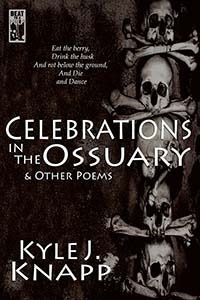 Celebrations on AmazonKyle's writing was his entire soul, his mind, his heart, his entire life existed through the written word. I know if I hadn't found the notebook someone would have. Anyone who loved Kyle, even half as much as I do, knows how important his work was to him. We all had hopes to save some of it.
Celebrations on AmazonKyle's writing was his entire soul, his mind, his heart, his entire life existed through the written word. I know if I hadn't found the notebook someone would have. Anyone who loved Kyle, even half as much as I do, knows how important his work was to him. We all had hopes to save some of it.
And you did, Amanda, thank you. And thank you for sharing some memories of Kyle with the rest of us. Deeply appreciated.
How long had you known Kyle?
 Amanda ShawI've known Kyle since I was fourteen, so 8 almost 9 years. I was sitting outside during lunch hour at school. He liked my moccasins and Green Day T-shirt so he sat beside me and just started talking to me; he tried to teach me to play hacky sack, but that didn't work, so for 8 years we just kept talking.
Amanda ShawI've known Kyle since I was fourteen, so 8 almost 9 years. I was sitting outside during lunch hour at school. He liked my moccasins and Green Day T-shirt so he sat beside me and just started talking to me; he tried to teach me to play hacky sack, but that didn't work, so for 8 years we just kept talking. Were you aware that he kept scores of notebooks in which to compose his poetry and other writings?
He didn't tell me about his writings until a couple years into our friendship, but I think the moment I became a part of them is when he told me about them. Last fall, after I returned from Colorado, was my first visit to the Mill Street house and the first time I actually saw the physical volume of his work though he’s always sent me a story here and there to edit; he always seemed to trust my opinion on his writing, but honestly I was usually just proofing his grammar. From early on I realized his works were special and unlike anything I've ever read.
You worked together on a short story inspired by Salinger, right? How’d that come about?
Kyle believed in me as a writer. I am really private about the things I write, mostly because they are the ramblings of the inner workings of my head, but I guess also because I am not confident in what I put on paper. I shared them with Kyle though; he was one of the very few I trust most. So anyway, last semester I was retaking creative writing and of course Kyle had to know about every assignment. I had a simple journal exercise that involved writing out a conversation between me and my favorite character; I shared that journal assignment in class and my professor really enjoyed the way I wrote the conversation with Seymour from “A Perfect Day for Bananafish,” by J.D. Salinger. My professor suggested this be the start of my short story assignment. I immediately called Kyle and told him about how I was going to attempt writing a story within another story. He had never read “Bananafish” so I loaned him the book Nine Stories. I worked on the story by myself and periodically sent Kyle the most recent version of it. He would add little edits here and there, but one evening he said he was bored and edited the entire story into his style of prose. For my final draft I mixed my final draft with Kyle's version. We had so much fun working on the story; we were planning to write a story together using the same basic idea, and plot line from my perspective and his perspective. I am really sad that didn't come to fruition; I think it would have been really great.
How did you find out he had died?
 Amanda and Kyle.The two weeks before Kyle died were really rough; I am only mentioning this because it is important to the day I found out he had passed. He had started drinking again, and we were really at odds. He wanted me around to help him, and I couldn't because I wanted him to stop drinking, and I had vowed to him a long time ago that I wouldn't be around him if he was drinking. I would talk to him on the phone and through email all he wanted, but I guess in my way of thinking, hanging out with him and driving him places was enabling him in some sort of way. The day before the fire, a Monday, he called me and begged me to take him for ice cream; he was drunk, so I said no. The fire happened that night, but I didn't find out until that Wednesday. Anyway, on Tuesday I was driving to Rochester for a concert and my boyfriend asked me if I had talked to Kyle that day because Kayla, Kyle’s sister, had posted a Facebook status asking if anyone had heard from him. It hadn't crossed my mind until that moment that Kyle had not called or texted that day, and really for 8 years, a day did not go by that he didn't make contact with me at least once. My heart sank and I said to my boyfriend "What if he is dead?" I called his phone and he didn’t answer; we both decided to ignore the fact that he was missing and enjoy the concert; Kyle would be okay. During the concert, I received text messages from a few high school friends stating "We love you" and "we're here for you," and I just disregarded them not connecting any dots. The next morning Steven, my boyfriend, woke up before me and logged onto Facebook on his phone; he told me to log onto my Facebook and all that I saw were a series of "RIP Kyle." My heart sank, and all I could hear was this weird wurring sound in my ears. I texted Kayla and said something like, "Tell me this isn't real." She didn't respond right away, so I just kept saying this is fake and calling Kyle's phone. Kayla finally texted back with something along the lines "I am so sorry, Amanda. Kyle is gone." I cried the entire rest of that day; Kyle's death is the first death I have ever experienced. Experienced feels like an odd word to use; what I mean is I have never lost a family member except for a grandfather when I was very young, but we were not close. Kyle was my best friend. I am not sure I have ever been closer with another human being. I tried to seek comfort from my grandmother, my mom, my friends, but no one knew what to say and all I could hear was that strange wurring sound in my ears. I wish I had taken him for ice cream.
Amanda and Kyle.The two weeks before Kyle died were really rough; I am only mentioning this because it is important to the day I found out he had passed. He had started drinking again, and we were really at odds. He wanted me around to help him, and I couldn't because I wanted him to stop drinking, and I had vowed to him a long time ago that I wouldn't be around him if he was drinking. I would talk to him on the phone and through email all he wanted, but I guess in my way of thinking, hanging out with him and driving him places was enabling him in some sort of way. The day before the fire, a Monday, he called me and begged me to take him for ice cream; he was drunk, so I said no. The fire happened that night, but I didn't find out until that Wednesday. Anyway, on Tuesday I was driving to Rochester for a concert and my boyfriend asked me if I had talked to Kyle that day because Kayla, Kyle’s sister, had posted a Facebook status asking if anyone had heard from him. It hadn't crossed my mind until that moment that Kyle had not called or texted that day, and really for 8 years, a day did not go by that he didn't make contact with me at least once. My heart sank and I said to my boyfriend "What if he is dead?" I called his phone and he didn’t answer; we both decided to ignore the fact that he was missing and enjoy the concert; Kyle would be okay. During the concert, I received text messages from a few high school friends stating "We love you" and "we're here for you," and I just disregarded them not connecting any dots. The next morning Steven, my boyfriend, woke up before me and logged onto Facebook on his phone; he told me to log onto my Facebook and all that I saw were a series of "RIP Kyle." My heart sank, and all I could hear was this weird wurring sound in my ears. I texted Kayla and said something like, "Tell me this isn't real." She didn't respond right away, so I just kept saying this is fake and calling Kyle's phone. Kayla finally texted back with something along the lines "I am so sorry, Amanda. Kyle is gone." I cried the entire rest of that day; Kyle's death is the first death I have ever experienced. Experienced feels like an odd word to use; what I mean is I have never lost a family member except for a grandfather when I was very young, but we were not close. Kyle was my best friend. I am not sure I have ever been closer with another human being. I tried to seek comfort from my grandmother, my mom, my friends, but no one knew what to say and all I could hear was that strange wurring sound in my ears. I wish I had taken him for ice cream. Tell me about going to where he died and finding the notebook?
 A page from Kyle's notebook.The first few days after Kyle died were the most bizarre days of my life. It felt as if everyone wanted to talk to me. I was bombarded with questions and "I'm sorrys." Many of our mutual friends visited the place where he died--I'd been referring to it as the Mill Street house--and described in horrifying detail how it was just gone. I decided I was not going to go there. The day of his memorial service solidified this decision; I would not visit where he died. I would not see the destruction. It was too hard, I just couldn't. I had been reading every day the last letters he sent me from his time in Florida [in rehab]. I've mentioned them before, but in one of the letters he wrote, "I still want to walk through walls in my dreams, and learn how to find you long after we die." I read and reread this line; I don't know if it was just my deep desire for him to be able to do this or he actually succeeded, but the night after his memorial service, I believe it was a Sunday, I had a dream; Kyle and I were sitting on the back deck of the Mill Street house drinking that organic dark coffee he loved so much, smoking cigarettes and talking. It was a fall day, there was a slight breeze, the air felt as if it had just rained though the sun was shining through the trees. I asked him directly, "Are you really dead," and he replied, "Yeah, I am really dead. I need you to do something. I need you to go back to the house. I left something there." I don't often have vivid dreams, and I hardly ever remember them if I do, but this was like a movie, clear as day. The next day I drove up and down Mill Street trying to gain the nerve to go to this place I had refused to go back to. I finally pulled in. The basement of the house was surrounded by yellow caution tape. I just stood by my car for a while trying to feel something; I guess trying to feel Kyle. I decided to cross the tape line, Kyle would have for me, and I walked around the house. First I went to the spot where his pseudo study was in the front of the house, nothing was there. Then I walked and stood above where the living room was; all I saw were dumbbell weights and charred magazines. I was getting so frustrated at this point. My heart had broken more than it was before seeing that place and I was not finding anything. I began to walk back to my car and happened to look down right at the place where his bedroom use to be and sitting there right on top of all the ash was a stack of charred papers. Even from above I recognized the handwriting as Kyle's. I didn't grab the papers then; I was too afraid that if I jumped down I wouldn't be able to climb out without getting cut by glass.
A page from Kyle's notebook.The first few days after Kyle died were the most bizarre days of my life. It felt as if everyone wanted to talk to me. I was bombarded with questions and "I'm sorrys." Many of our mutual friends visited the place where he died--I'd been referring to it as the Mill Street house--and described in horrifying detail how it was just gone. I decided I was not going to go there. The day of his memorial service solidified this decision; I would not visit where he died. I would not see the destruction. It was too hard, I just couldn't. I had been reading every day the last letters he sent me from his time in Florida [in rehab]. I've mentioned them before, but in one of the letters he wrote, "I still want to walk through walls in my dreams, and learn how to find you long after we die." I read and reread this line; I don't know if it was just my deep desire for him to be able to do this or he actually succeeded, but the night after his memorial service, I believe it was a Sunday, I had a dream; Kyle and I were sitting on the back deck of the Mill Street house drinking that organic dark coffee he loved so much, smoking cigarettes and talking. It was a fall day, there was a slight breeze, the air felt as if it had just rained though the sun was shining through the trees. I asked him directly, "Are you really dead," and he replied, "Yeah, I am really dead. I need you to do something. I need you to go back to the house. I left something there." I don't often have vivid dreams, and I hardly ever remember them if I do, but this was like a movie, clear as day. The next day I drove up and down Mill Street trying to gain the nerve to go to this place I had refused to go back to. I finally pulled in. The basement of the house was surrounded by yellow caution tape. I just stood by my car for a while trying to feel something; I guess trying to feel Kyle. I decided to cross the tape line, Kyle would have for me, and I walked around the house. First I went to the spot where his pseudo study was in the front of the house, nothing was there. Then I walked and stood above where the living room was; all I saw were dumbbell weights and charred magazines. I was getting so frustrated at this point. My heart had broken more than it was before seeing that place and I was not finding anything. I began to walk back to my car and happened to look down right at the place where his bedroom use to be and sitting there right on top of all the ash was a stack of charred papers. Even from above I recognized the handwriting as Kyle's. I didn't grab the papers then; I was too afraid that if I jumped down I wouldn't be able to climb out without getting cut by glass. The next night, all I could think about was that notebook. A bunch of my friends were at the Dryden Hotel. I went to them and asked if they would come with me. I assembled a group of five people all of which were Kyle's friends and we went to the Mill Street house. We all kind of dispersed; I think everyone wanted to pay their respects and say goodbye to Kyle. Two of my friends and myself went to where the house was and they helped me get down to the notebook with tiny cell phone lights. I grabbed the pages. My mind was clear this night. I felt almost brave like I was on a sacred mission. Upon grabbing the pages, we stayed awhile longer. We didn't really talk to each other much. I guess grief is really personal, so even feeling similar none of us knew what to say to each other. Many of us were in tears as we left. I had to dry out the pages as they were wet from rain the previous day, and once they were dry they were so fragile. A few of the pages fell to dust at the slightest touch. The ones that I salvaged though, I can't even describe the feeling. I remember at the memorial I heard more than one person say how sad it was all of his writing was gone, but knowing that not all of it was gone was almost a relief. These small fragments from the year 2010 somehow survived. I don't think any of the pages show a complete poem or short story, but some very raw and honest thoughts survived. I gave the pages to Meta and Kayla. I don’t really believe that the dream was actually Kyle, and I don't think I really could have avoided going back to the house forever.
 Celebrations on AmazonKyle's writing was his entire soul, his mind, his heart, his entire life existed through the written word. I know if I hadn't found the notebook someone would have. Anyone who loved Kyle, even half as much as I do, knows how important his work was to him. We all had hopes to save some of it.
Celebrations on AmazonKyle's writing was his entire soul, his mind, his heart, his entire life existed through the written word. I know if I hadn't found the notebook someone would have. Anyone who loved Kyle, even half as much as I do, knows how important his work was to him. We all had hopes to save some of it. And you did, Amanda, thank you. And thank you for sharing some memories of Kyle with the rest of us. Deeply appreciated.
Published on September 17, 2013 16:32
September 12, 2013
On Sunset Blvd, Drinking Sam Adams with Garnett Elliott
Garnett Elliott and I were at the cyber bar off Sunset Blvd, having the last of our Sam Adams. I had put the finishing touches on formatting his “Hell Up in Houston” earlier in the day.
“Drifter continues to sell a couple of copies a day, which is good.” I said. “Word of mouth continues to build. Wayne D. Dundee and Keith Rawson have agreed to write a Jack Laramie. And I'm going to write two.” I swallow the last of my amber brew.
Garn downs his ale faster than he could spill it. He glances at what remains of his hairline in the mirror behind the bar and says: “The lineup looks good, David, and I can start work on #3 shortly.”
“You mentioned Lansdale as an inspiration. Any movies in particular? I'm looking to motivate myself before writing,” I say, reaching for my Kindle Fire that I had brought along to show off the “Hell Up” book.
“Hud and Giant are good—if long—Texas movies, though they're not really noir. Most of the inspiration so far has come from talking to co-workers who are from different regions of the state, also reading Thompson, and Latimer, who wrote Solomon's Vineyard. That story in particular had an influence on “Hell Up in Houston.”
I leaf through the Kindle and find Vineyard but a little expensive for my weekly allotment for books. Then I find Jim Thomson’s Pop. 1280 and download it.
“What’s next for you, Garn?”
“Oh, lots of stuff. Tons of stuff, actually.” He pulls out a planner book and riffs the pages, which are all blank. “Big, big projects. I've been thinking about trying my hand at old school Sword and Sorcery--you know, like those old Daw paperbacks with the cracked yellow spines from the 60s and 70s. What the turbo-geeks call 'Appendix N.' After that, definitely more hardboiled, maybe even something contemporary. Dystopian sci-fi, too. The sky's the limit, Big D.”
He begs me for cab fare back to his cyber studio apartment. It's embarrassing, and I've already sprung for the Sammy A, but what are you going to do? On his way out the bar, Garn convulses like he's just had a seizure and claws a shabby Moleskine out of his back pocket. “I've got it,” he says, writing furiously with a crayon stub, “it's a three-part novella about a crew of ne'er-do-well carpet cleaners, their naive boss, a right-wing radio host kidnapped by his own fans, and an organ-legging operation run out of a gated retirement community in north Tucson ...”
"Another round,” I say, waving to the bartender.
Now Available ...
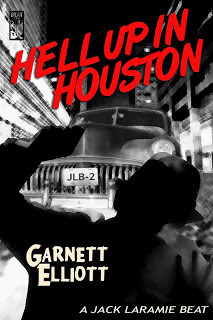
“Drifter continues to sell a couple of copies a day, which is good.” I said. “Word of mouth continues to build. Wayne D. Dundee and Keith Rawson have agreed to write a Jack Laramie. And I'm going to write two.” I swallow the last of my amber brew.
Garn downs his ale faster than he could spill it. He glances at what remains of his hairline in the mirror behind the bar and says: “The lineup looks good, David, and I can start work on #3 shortly.”
“You mentioned Lansdale as an inspiration. Any movies in particular? I'm looking to motivate myself before writing,” I say, reaching for my Kindle Fire that I had brought along to show off the “Hell Up” book.
“Hud and Giant are good—if long—Texas movies, though they're not really noir. Most of the inspiration so far has come from talking to co-workers who are from different regions of the state, also reading Thompson, and Latimer, who wrote Solomon's Vineyard. That story in particular had an influence on “Hell Up in Houston.”
I leaf through the Kindle and find Vineyard but a little expensive for my weekly allotment for books. Then I find Jim Thomson’s Pop. 1280 and download it.
“What’s next for you, Garn?”
“Oh, lots of stuff. Tons of stuff, actually.” He pulls out a planner book and riffs the pages, which are all blank. “Big, big projects. I've been thinking about trying my hand at old school Sword and Sorcery--you know, like those old Daw paperbacks with the cracked yellow spines from the 60s and 70s. What the turbo-geeks call 'Appendix N.' After that, definitely more hardboiled, maybe even something contemporary. Dystopian sci-fi, too. The sky's the limit, Big D.”
He begs me for cab fare back to his cyber studio apartment. It's embarrassing, and I've already sprung for the Sammy A, but what are you going to do? On his way out the bar, Garn convulses like he's just had a seizure and claws a shabby Moleskine out of his back pocket. “I've got it,” he says, writing furiously with a crayon stub, “it's a three-part novella about a crew of ne'er-do-well carpet cleaners, their naive boss, a right-wing radio host kidnapped by his own fans, and an organ-legging operation run out of a gated retirement community in north Tucson ...”
"Another round,” I say, waving to the bartender.
Now Available ...

Published on September 12, 2013 08:25



